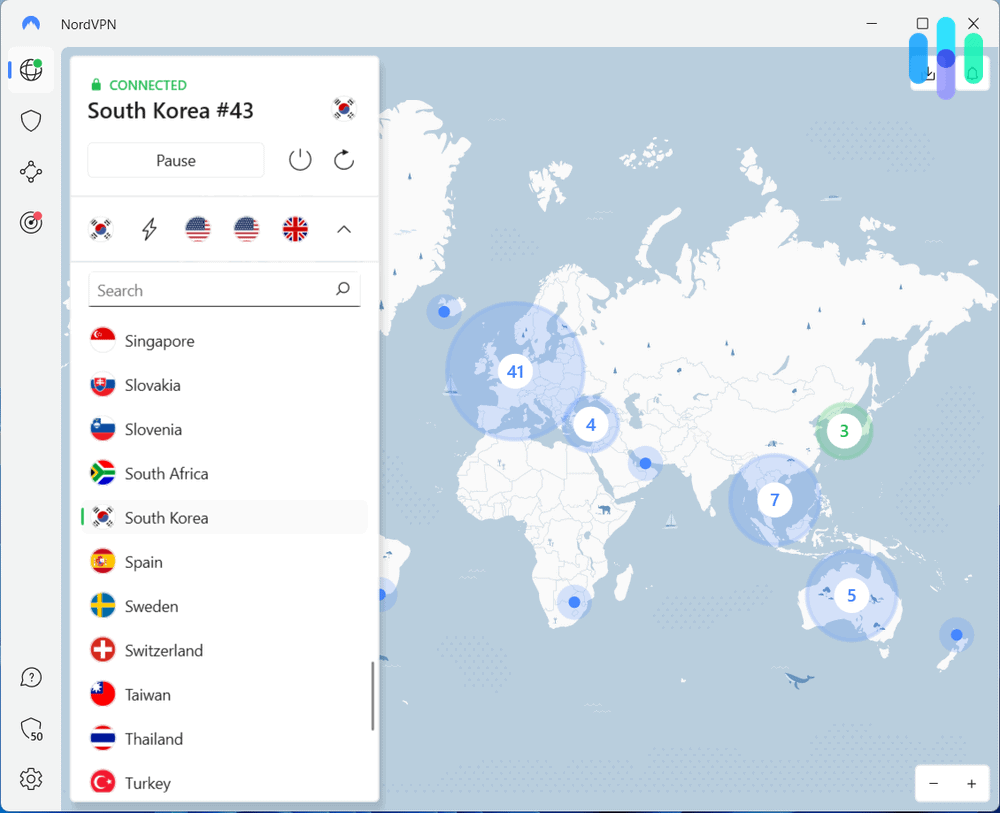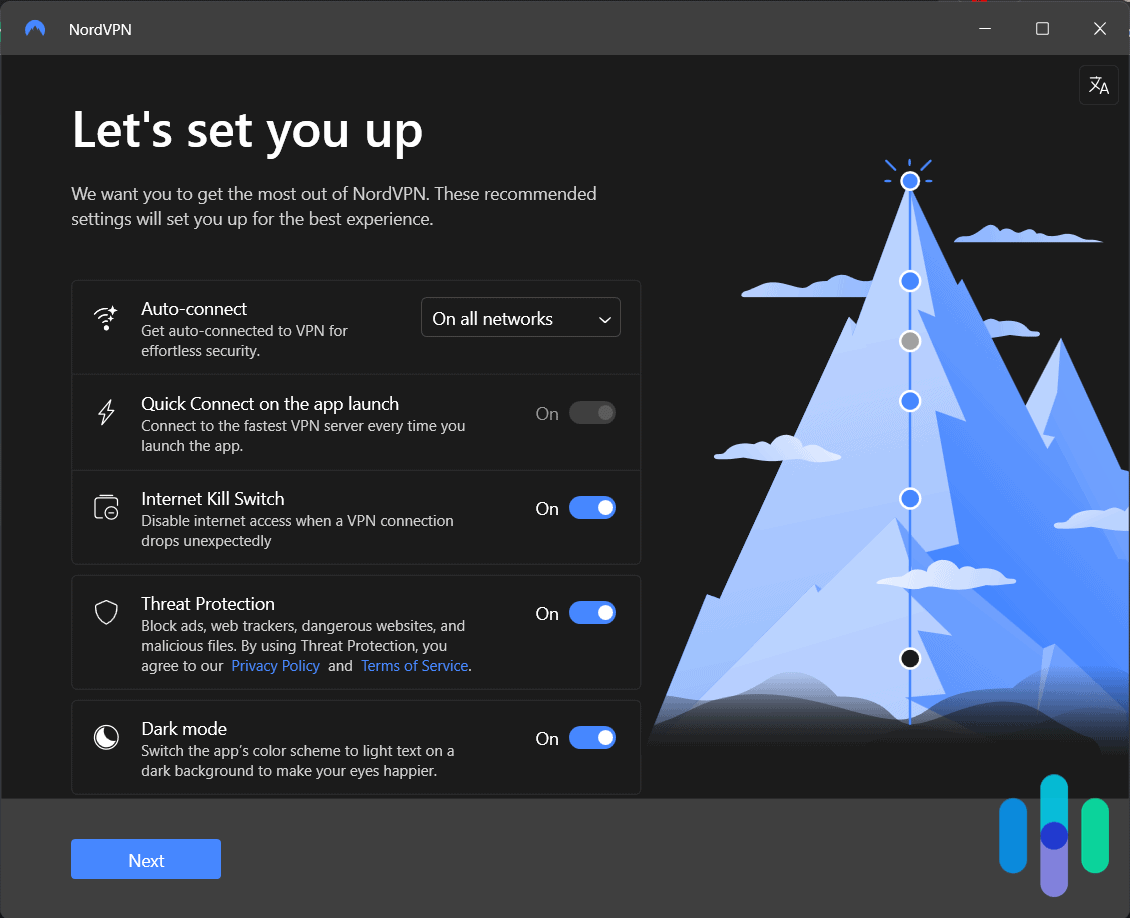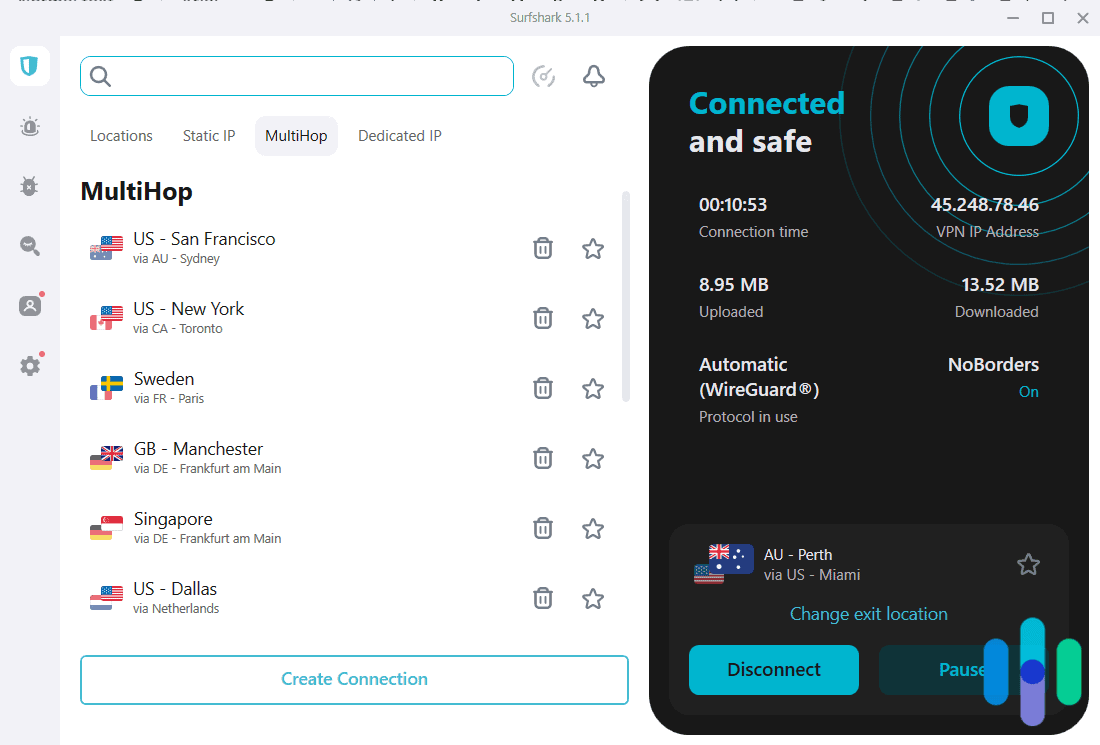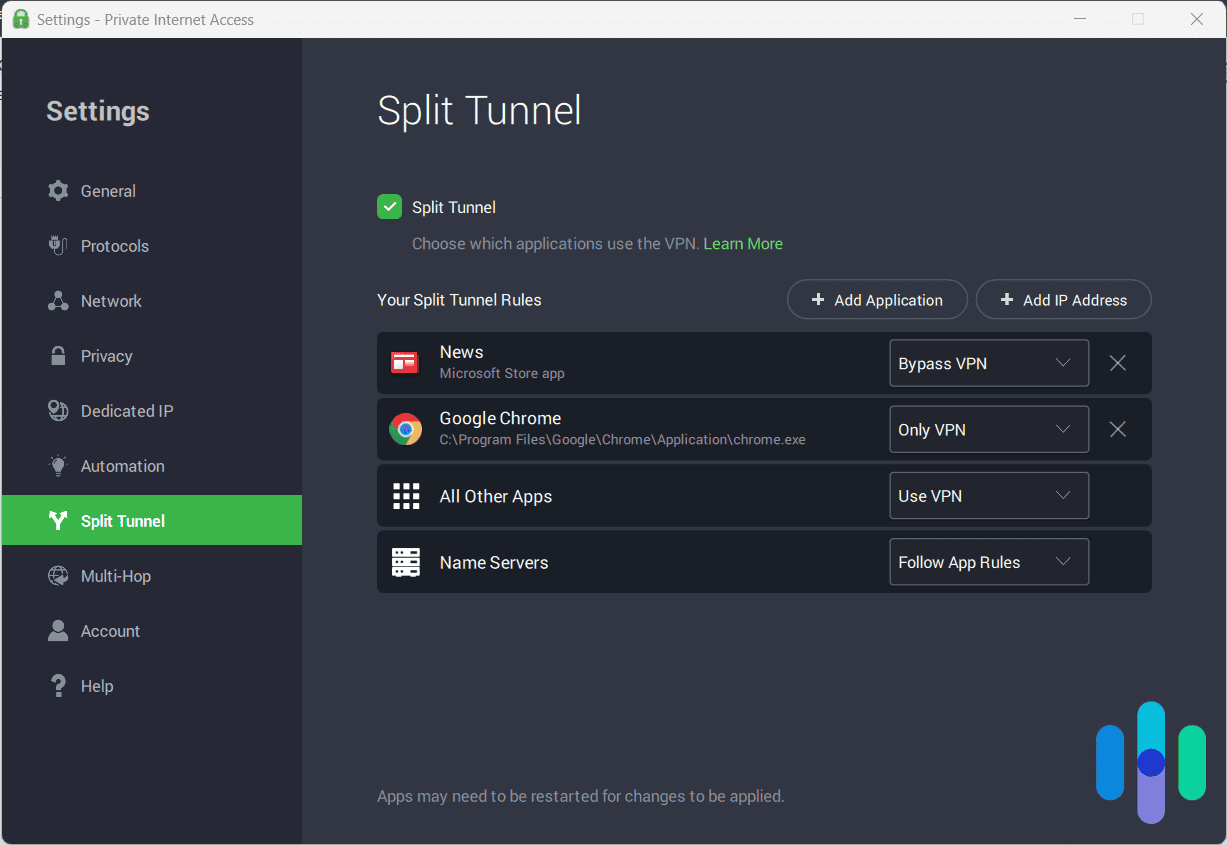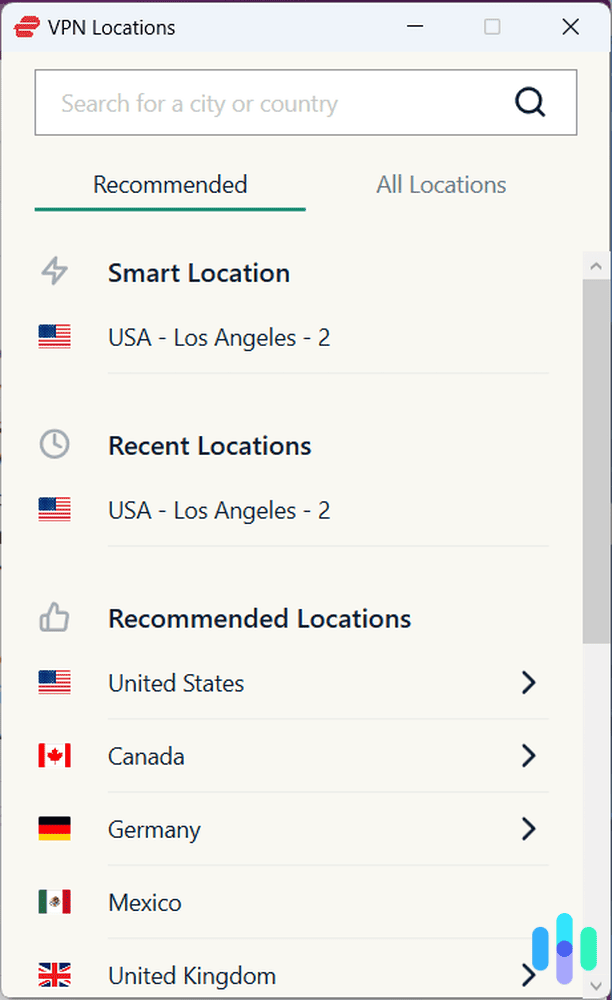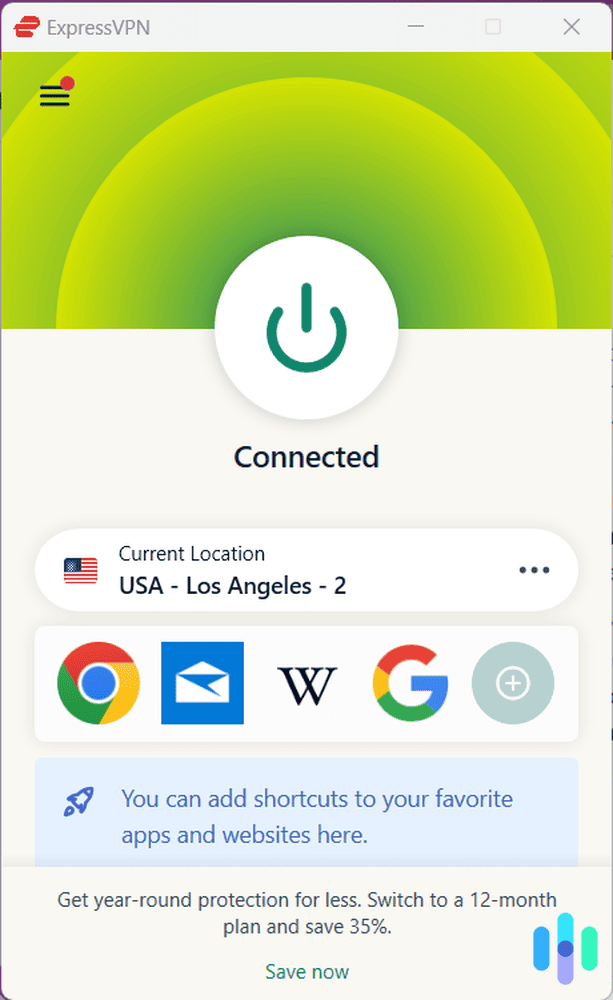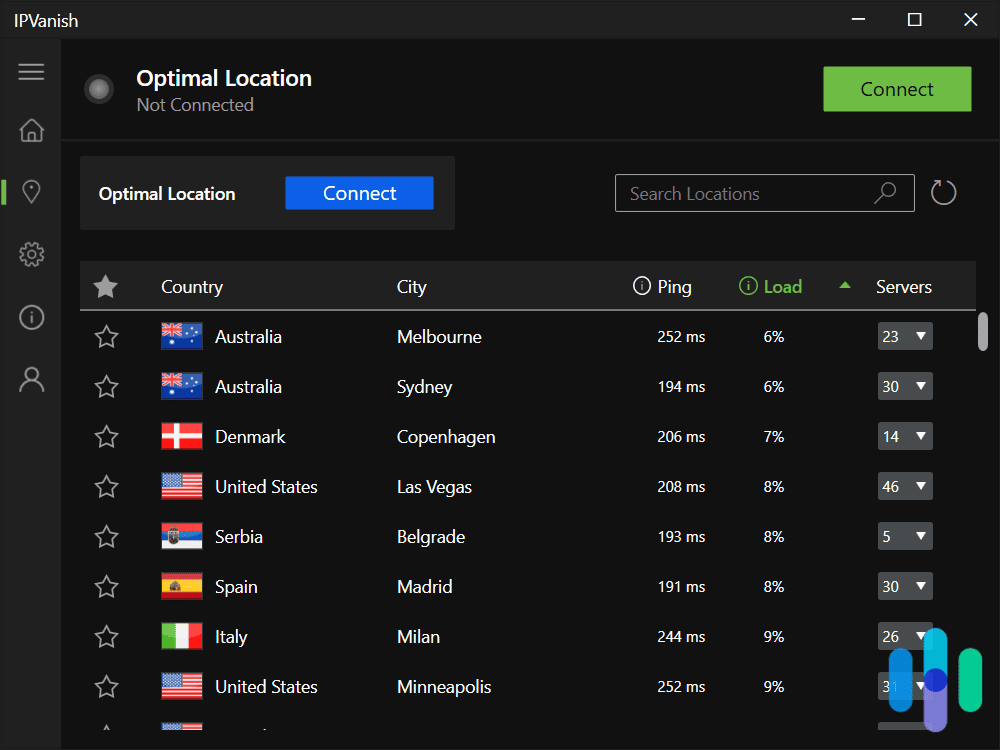Best VPNs for Windows
Our top pick, NordVPN, provides fast speeds on all Windows devices, simple installation, and malware protection.


- Fast speeds on Windows devices
- Simple Windows installation
- Offers protection from Windows-based malware

- User-friendly Windows interface
- Compatible even with older versions of Windows
- Offers Windows-configured servers

- Works on the newest versions of Windows
- Low latency on Windows devices
- Windows version provides multihop encryption
Windows has dominated the desktop market for decades, but despite that, it still isn’t perfectly secure. Sure, you’ve set secure passwords and installed antivirus software, but the moment you go online, your data and personal information could be at risk. That’s why a VPN is necessary.
>> Related Reading: The Best Windows Password Managers
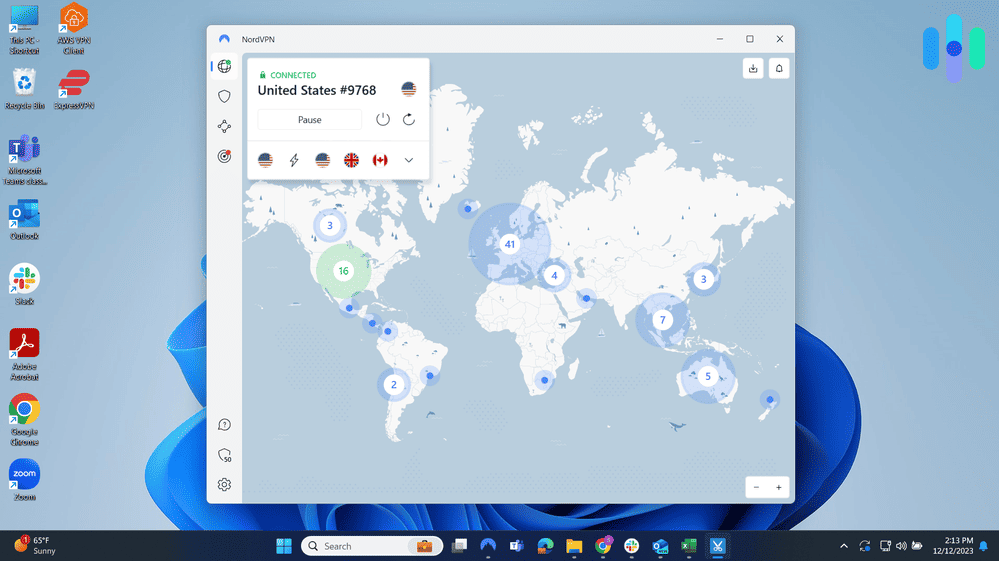
VPNs, or virtual private networks, encrypt your data so that no one on the internet can intercept it. When it comes to choosing the best VPNs for Windows, we have all the information you need. You see, we do most of our VPN tests on a Windows PC. We test VPN speeds, the security of connections, and even the usability of VPN apps. We know for a fact that some VPNs work better on Windows than other options.
These five VPNs in particular stand out for Windows users.
The Best Windows VPNs in 2025 Ranked
- NordVPN - Best for Office and Work Use
- Surfshark - Best for Changing IP Address Location
- Private Internet Access - Best for Multitasking
- ExpressVPN - Best User-Experience
- IPVanish - Best Speeds
What Makes a Good Windows VPN?
Before we unpack our top picks, let’s first discuss what makes a VPN particularly great. This applies to all operating systems, but especially Windows.
First off, the VPN has to be secure. It should use the 256-bit AES standard or an equivalent VPN encryption standard like ChaCha20. It should also use a reputable VPN protocol, like OpenVPN and WireGuard. Those all sound like jargon for now, but we’ll explain them as we go on. Just know that you need those to keep your IP address hidden and your data safe.
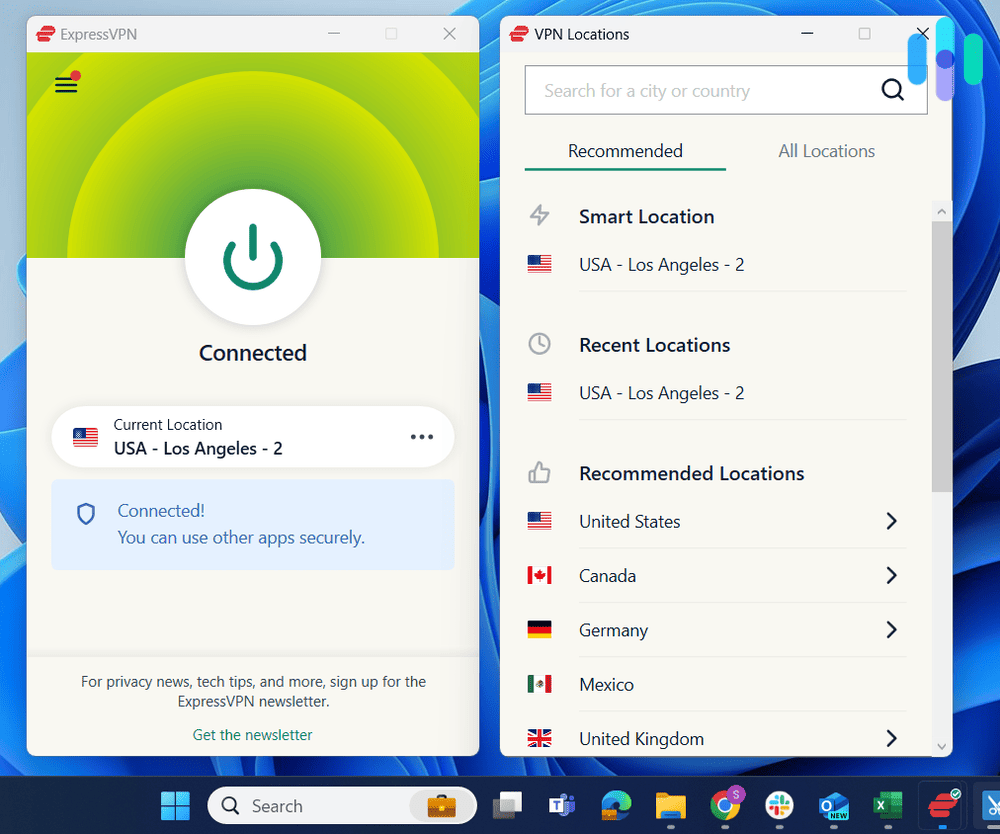
Second, a good VPN must have a sizable server network. It doesn’t need tens of thousands of servers, but it should at least have enough servers to accommodate traffic from all users. It should also have servers in different countries – we’d say around 70 countries – to provide access to blocked websites and geo-restricted content.
Lastly, a good VPN offers all necessary VPN features, and then some. Here are some examples of VPN features we find particularly handy for Windows computers:
- Kill switch
- Split tunneling
- Malware, ad, and tracker blocking
- Virtual LAN
- Multi-hop
Don’t worry, we’ll explain those features in greater detail as we reveal which VPNs have them. For now, know that every single one of our top picks have at least one of those features.
Speaking of our top-pick VPNs for Windows, let’s learn more about them in this side-by-side comparison. After that, we’ll do a deep-dive analysis of why they are the best Windows VPNs.
The Best VPNs for Windows Compared
| System |
NordVPN

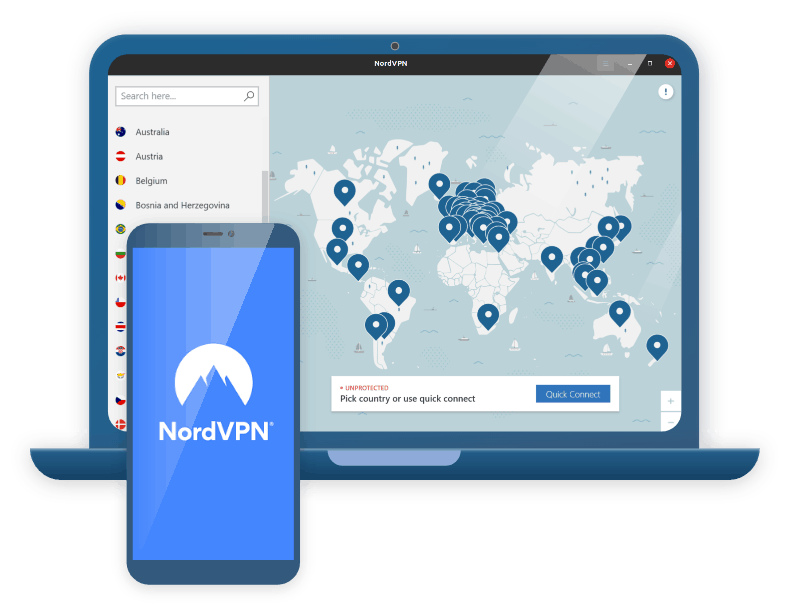
|
Surfshark


|
Private Internet Access

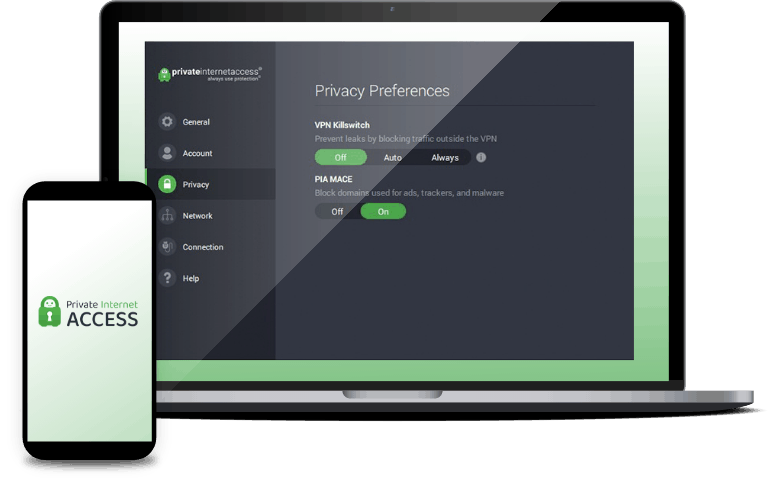
|
ExpressVPN

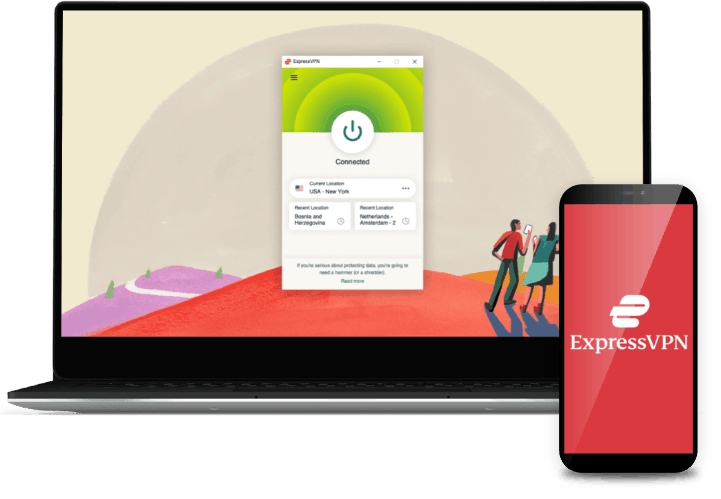
|
IPVanish


|
|---|---|---|---|---|---|
| Ranking | 1st | 2nd | 3rd | 4th | 5th |
| Ratings | 9.7/10 | 9.5/10 | 9.4/10 | 9.1/10 | 9.3/10 |
| Encryption | 256-bit AES | 256-bit AES | 128-bit to 256-bit AES | 256-bit AES | 256-bit AES |
| VPN protocol |
|
|
|
|
|
| No. of servers | 6,000+ | 3,200+ | 14,000+ | 3,000+ | 2,000+ |
| No. of server locations | 111 countries | 100 countries | 91 countries | 105 countries | 75 cities |
| Extra features |
|
|
|
|
|
| Average download speed* | 222 Mbps | 218 Mbps | 226 Mbps | 204 Mbps | 239 Mbps |
| Average upload speed* | 205 Mbps | 202 Mbps | 216 Mbps | 198 Mbps | 227 Mbps |
| Microsoft Store app | No | Yes | No | No | No |
| Downloadable Windows app | Yes | Yes | Yes | Yes | Yes |
| Best average monthly price | $3.79 | $2.39 | $2.03 | $8.32 | $2.99 |
| Read Review | NordVPN Review | Surfshark Review | Private Internet Access Review | ExpressVPN Review | IPVanish Review |
* While connected to a 250 Mbps fiber-optic internet connection
Deep-Dive Into The Best Windows VPNs
-
1. NordVPN - Best for Office and Work Use
View Plans Links to NordVPNProduct Specs
Multihop Yes Camouflage Mode Yes Kill switch Yes Split Tunneling Yes Netflix Yes Torrenting Yes 
VPN Protocol
A VPN protocol is a set of instructions on how to get encrypted data to the internet. Like many VPNs, such as Surfshark and IPVanish, NordVPN uses OpenVPN because it’s open-source.1 In our experience, OpenVPN was reliable and didn’t disconnect even after eight hours of continuous use. However, it wasn’t the only option. Based on WireGuard2, another open-source protocol, Nord built NordLynx as a faster but secure alternative to OpenVPN. And indeed, in our tests, NordVPN was about 10-percent faster with NordLynx.
Server Network
NordVPN has a vast fleet made of over 6,300 servers, but more than that, it has servers in 111 countries. NordVPN’s servers and IP addresses are so well-dispersed that they’re in more than half of all countries in the world. Very few VPNs can say the same, two of which made this list. They are Surfshark with servers in 100 countries and ExpressVPN with servers in 105.
Thanks to NordVPN’s vast fleet, we didn’t have any problems tracking down movies and shows we want to watch. We got a U.K. IP address to stream from Netflix U.K. and a Spain IP address to access the local stream of the Women’s World Cup – a good VPN for streaming, indeed.
NordVPN’s Countries List using the Windows app Extra Features
There’s too many to mention here, but we’ll highlight a couple of NordVPN’s extra features we used for Windows. The first one was Threat Protection, which blocked malicious websites, ads, and trackers. While not a full-on antivirus, NordVPN blocked our access to a malicious link from a convincing phishing email, potentially saving us from identity theft.
The second one was Double VPN, which doubled the encryption and tunneling for an extra secure connection to the internet. We found this most useful at work, where we need to share confidential files, emails, and such – Double VPN provides just the right level of security for those purposes.
What We Like
- Functional and generally bug-free Windows app
- Affordable VPN for long-term subscriptions
- Worldwide server availability
- Strict logging policy
What We Don’t Like
- Not great upload speeds
- Could use more servers in Africa and the Middle East
- P2P file sharing and torrenting not supported in most servers
- Less-than-ideal customer service
Windows is a magnificent workhorse of an operating system, and we found that NordVPN was the best VPN to complement it in an office or work setting. That’s because it matches the versatility of Windows perfectly, offering robust security (encryption, protocol options, Threat Protection, Double VPN) and an efficient interface. Setting it up took only 2 minutes, for starters, and right from the start, it let us customize the recommended settings to our liking.
NordVPN Windows app initial set-up We loved the auto-connect feature in particular, which connected our office computers to NordVPN as soon as we turned them on. That’s one less item off of our pre-work ritual.
Going deeper, we found other useful features such as Meshnet, a virtual local area network (LAN) similar to the Radmin VPN we recently looked at. A LAN is typically a network of devices connected to the same router, used in private file sharing and accessing network devices like printers. By making it virtual, Meshnet made it possible to connect Windows computers from anywhere in the world to the same LAN – even our colleague vacationing in Asia was able to print out a script for our YouTube channel3 using our office printer.
Of course, keep in mind that those extra features are just that: extras. NordVPN performed its duties as a VPN with marksman-like accuracy. We performed technical tests to confirm that the VPN was working, and NordVPN passed with flying colors. And while its 222 Mbps download and 205 upload speed averages were just middle-of-the-pack, NordVPN didn’t hamper us from performing our office duties.
-
2. Surfshark - Best for Changing IP Address Location
View Plans Links to SurfsharkProduct Specs
Multi-hop Yes Camouflage Mode Yes Kill switch Yes Split Tunneling Yes Netflix Yes Torrenting Yes 
VPN Protocol
Surfshark’s VPN protocols – OpenVPN, WireGuard, and IKEv2 – are widely-used protocols and the exact same ones offered by IPVanish, another entry on this list. Surfshark’s Windows app, however, seemed to work best with WireGuard. Most times, the app managed to establish a WireGuard connection in just two to three seconds, whereas it often took five to 10 seconds to connect to OpenVPN.
Server Network
Surfshark is another VPN with a vast server network. It only has about 3,200 servers (almost half of NordVPN’s fleet), but it has servers in 100 countries. Again, that’s more than half of the world. Access to all those servers are included in all Surfshark subscriptions. That’s why it’s the best VPN for changing a PC’s IP address location.
Extra Features
When it comes to extra features, Surfshark’s Camouflage Mode is top of the list. Some networks, usually campus or office networks, have firewalls that block VPN traffic, but countries like China also have large-scale firewalls to control VPN use. If you’re in a situation where you can’t use a VPN because of a firewall, the Camouflage Mode kicks in to make your VPN traffic seem like normal traffic not coming from a VPN.
We had some fun testing this feature out. We asked our IT administrator to block VPN traffic on our network, and indeed, traffic from Surfshark managed to get through. Meanwhile, Hola VPN, without a Camouflage Mode, was immediately detected and blocked.
What We Like
- Streamlined and user-friendly Windows interface
- Has servers in 100 countries
- Great at getting around network- and geo-restrictions
- Frequent app updates for performance and security improvements
What We Don’t Like
- Slow to connect when using OpenVPN
- Constant offers to upgrade to Surfshark One
- Limited app customizability
- Live chat uses bot; doesn’t immediately connect you to a live agent
Windows users change their IP address location for different reasons: unblocking another region’s Netflix library, booking cheaper flights, visiting blocked websites, or just keeping cybercriminals guessing their location. Whatever your reasons, Surfshark is the best VPN to do it with.
Surfshark has servers in 100 countries – tied with CyberGhost and trailing a little behind ExpressVPN. Of course, you should still check if the location you’re planning to use is on Surfshark’s list of servers4, but with that many locations, your chances are pretty good.
We’d like to point out another unique Surfshark feature called Dynamic MultiHop. This is similar to NordVPN’s DoubleVPN. It encrypts your traffic twice and routes it through two servers instead of just one for extra privacy. The difference is unlike with NordVPN where the two servers are pre-set pairs, Surfshark lets you choose the two servers you’ll connect to. That way, you can still control your IP address location.
Surfshark Dynamic MultiHop in action In the screenshot above, the first server was in Miami, while the second one was in Australia. That means to the websites we accessed during that time, our IP address appeared to be from Australia.
-
3. Private Internet Access - Best for Multitasking
View Plans Links to Private Internet AccessProduct Specs
Multihop Yes Camouflage Mode No Kill switch Yes Split Tunneling Yes Netflix Yes Torrenting Yes 
Encryption and VPN Protocol
Private Internet Access uses two protocols you’re already familiar with: OpenVPN and WireGuard. In addition, though, it offers Shadowsocks and SOCKS5, protocols for proxy servers. Like VPNs, proxies can change your IP address location but without encryption, so they’re not private. On the plus side, proxies are faster. We’ve been able to utilize all 250 Mbps of our network speed using SOCKS5, compared to WireGuard where our connection dropped to 226 Mbps. If you need to change your PC’s location for less data-sensitive tasks like online gaming, Private Internet Access is a good choice.
Server Network
Private Internet Access has a massive fleet of 14,000 servers spread across 84 countries, but what we found special about PIA is that it has servers in each of all 50 U.S. states. Your proximity to the VPN server can help improve your browsing speed. When we connected to Private Internet Access’ server right here in Brooklyn, we got 226 and 216 Mbps download and upload speeds, respectively. That’s second only to IPVanish, which we hailed the fastest VPN for Windows in this list.
Extra Features
Private Internet Access subscriptions don’t offer a lot of extra features, but just like our top pick NordVPN, it can block malware, ads, and trackers when you’re connected to the VPN. PIA calls this feature MACE – yes, like the pepper spray brand. Hackers can’t fool us twice with phishing attempts, but just to test out MACE, we clicked the same link that NordVPN protected us from earlier. Our “trust fall” exercise worked; PIA came through and promptly blocked the site.
What We Like
- Advanced split tunneling option
- Adjustable encryption standard (128- or 256-bit AES)
- Servers in 86 countries and all 50 U.S. states
- 45-day VPN trial
What We Don’t Like
- Windows app docked to the taskbar
- Live chat support is not 24/7
- Difficulty in making changes to account (changing password, upgrading/canceling subscription, etc.)
- Some locations offered are virtual locations
Windows makes it easy to multitask, but using a VPN not built for multitasking might hamper that experience. For example, when we connected to Private VPN’s (not to be confused with Private Internet Access) Australia server, our desktop’s News widget showed us news items local to Australia. We had to turn off the VPN to access local news, which wasn’t multitasking-friendly. Imagine if we were doing something that needed VPN protection. We would have had to connect and disconnect repeatedly.
This is where Private Internet Access delivered in a huge way through its advanced split tunneling. Split tunneling is a common VPN feature that allows users to route some traffic through the VPN and others to an unencrypted network. In the example above, if Private VPN had split tunneling, we would have been able to set the News widget to bypass the VPN in order to get real local news.
Private Internet Access advanced split tunneling In contrast, Private Internet Access has one of the most advanced and customizable split tunneling features we’ve ever tested. You can get really granular – for each app we added to PIA’s split tunnel, we were given the option to either make it bypass the VPN or make it connect only via the VPN. We made the News app bypass the VPN, of course, but for good measure, we also set Chrome to “only VPN,” meaning, it will only connect to the internet when Private Internet Access is on.
-
4. ExpressVPN - Best User-Experience
View Plans Links to ExpressVPNProduct Specs
Multihop No Camouflage Mode Yes Kill switch Yes Split Tunneling Yes Netflix Yes Torrenting Yes VPN Protocol
ExpressVPN is another VPN that offers its own protocol called Lightway. Its expertise? Establishing connections quickly. It was indeed quick on its feet, taking only about a second to secure our network. That said, we were disappointed by its overall speed. With Lightway running, ExpressVPN ranked the slowest among the five VPNs on this list, notching a download speed of only 204 Mbps.
Server Network
ExpressVPN is second only to NordVPN when it comes to server locations with 105 countries, but ExpressVPN runs a TrustedServer network. This is essentially a network of RAM-based servers, different from traditional servers that run on hard disk drives. Because they run on random access memory (RAM), a temporary memory bank, all data pertaining to VPN usage that could have been stored are wiped after every reboot. This makes RAM-based servers more private and secure.
Of course, ExpressVPN isn’t the only one with RAM-based servers – NordVPN, Surfshark, and Private Internet Access have those, too – but ExpressVPN was one of the pioneers of this technology.
ExpressVPN Recommended Locations Extra Features
You won’t find a lot of extra features from an ExpressVPN plan, but it does have a kill switch. This feature, a mainstay in stealthy VPNs, blocks your access to the internet if you’re not connected to a VPN. When we forgot to connect ExpressVPN before attempting to torrent open-source software, our torrent client didn’t connect at all, saving us from receiving a piracy warning from our ISP – something that could happen even if you’re torrenting legally, which is why we recommend using a VPN when torrenting. Interestingly, ExpressVPN is also one of the best VPNs for torrenting.
What We Like
- Intuitive, user-friendly app
- Quick to establish VPN tunnels
- RAM-based servers
- Threat Manager blocks ads and malicious sites
What We Don’t Like
- Not the fastest option for Windows
- Requires a device restart after installation
- Expensive subscriptions
- Only five simultaneous connections per account
We initially encountered some hiccups installing ExpressVPN on our Windows machine, probably because we had too many VPN apps installed. Once we got it up and running, though, it proved to be the easiest VPN to use for Windows. It has a super straightforward interface – just look at the screenshot we snapped below.
ExpressVPN’s Windows App We get that some VPN apps are trying to stand out by making their interface unique, like NordVPN’s map-based server selection. We like the aesthetics and appreciate the effort, but for some users, a simple VPN app with a quick-connect button and well-laid-out VPN server list is more appropriate. After all, you won’t spend a lot of time interacting with the app once it’s connected.
Beyond ExpressVPN’s simplicity, though, we found its app rich in functions. For example, within the Windows app, there are built-in tools like an IP address checker, a DNS leak test, and a WebRTC leak test. These are some of the same tools we use to confirm that a VPN is working, but with ExpressVPN, we didn’t have to leave the app to check. The built-in tools were just what we needed.
-
5. IPVanish - Best Speeds
View Plans Links to IPVanishProduct Specs
Multi-hop Yes Camouflage Mode No Kill switch Yes Split Tunneling Yes Netflix Yes Torrenting Yes, with uTorrent VPN Protocol
IPVanish uses the OpenVPN, WireGuard, and IKEv2 protocols, which again, are common in the industry. That said, IPVanish seemed to have found a way to integrate these protocols, especially WireGuard, in the most efficient way. This was made evident by the VPN’s impressive speeds. Of the five VPNs listed on this page, IPVanish led both the download and upload speed categories, recording averages of 239 Mbps download speed and 227 Mbps download speed in our series of five speed tests.
Server Network
With 2,000 servers in 75 countries, IPVanish is one of the fastest-growing VPNs in terms of server size. And if speed is your priority, IPVanish made it easy to find the fastest server available to you through load filtering. Essentially, by clicking the Load tab in the server menu page, we were able to find the servers with the lightest load at the time, meaning, they are likely to run faster than high-load servers.
Extra Features
When it comes to extra features, we liked IPVanish’s OpenVPN Scramble, which worked similarly to Surfshark’s Camouflage Mode. It helped hide the fact that we were using a VPN from our office network’s firewall, so this should be effective too in countries where VPNs are illegal or highly-monitored.
What We Like
- Fast speeds with WireGuard and OpenVPN protocols
- Server filtering makes finding the right server easier
- OpenVPN Scramble
- Sizable server network
What We Don’t Like
- Asked to give permission to make changes to our PC everytime the app launched
- No Windows taskbar widget for quick access
- Has (allegedly) shared customer logs in the past
- Located in the U.S. (a country that is not very privacy-friendly)
Unless you’re hiding Pentagon-level secrets in your PC, chances are, you’re only looking for a fast and reliable VPN to keep your daily browsing activity private. That’s exactly what we got from our IPVanish subscription. When we compared VPN speeds, IPVanish running OpenVPN ranked as the second fastest VPN overall. It decreased our download speed by only four-percent and our upload speed about five-percent.
IPVanish load filtering We duplicated the speed test for this guide, this time using WireGuard as the protocol, and the results concurred with our previous test. We notched a 239 Mbps download speed, a 4.3-percent decrease from our 250 Mbps network. Needless to say, we were able to keep busy downloading stuff online while connected to IPVanish.
We also recorded overall good latency readings from IPVanish, a good indication that it can work as a gaming VPN. Most of the time, the servers we connected to maintained a latency (ping) reading of less than 60 milliseconds. That means IPVanish’s network took only that much time to send a data packet from our device to the speed test tool’s server, which can translate to a smoother online gaming experience. PC Game Pass, anyone?
How To Choose a Windows VPN: Our Methodology
That’s about it: The best Windows VPNs, depending on what you’re looking for, are NordVPN, Surfshark, Private Internet Access, ExpressVPN, and IPVanish. You’re probably wondering how exactly we came to this conclusion.
For over half a decade now, we’ve kept a list of the best VPNs in the market. We update this list at least once a year, and since we already have a stringent protocol for choosing and testing the VPNs we include in the list, it was a good place for us to start.
After firing up our Windows laptops and PCs, we re-tested each of the 13 best VPNs with a specific focus on finding which ones work best on Windows. We paid close attention to the user-experience, the Windows app interface, the features available to Windows users, and performance on Windows.
From there, we figured out which VPN is best for which uses on Windows:
- NordVPN: Best for office and work use
- Surfshark: Best for changing Windows IP address location
- Private Internet Access: Best for multitasking
- ExpressVPN: Best user-experience
- IPVanish: Best speeds
Setting Up a VPN on Windows 10 and 11
Now that you know our top picks, and you probably even have favorites now, let’s talk about using a VPN on Windows, starting with setting up the VPN.
There are two common methods of installing a VPN on Windows.
The first one is by downloading the VPN’s app from the Microsoft Store, the app repository for Windows PCs. This is the more straightforward route, but not all VPNs have apps in the Microsoft Store. Among our five top picks, Surfshark was the only one that had a native app.
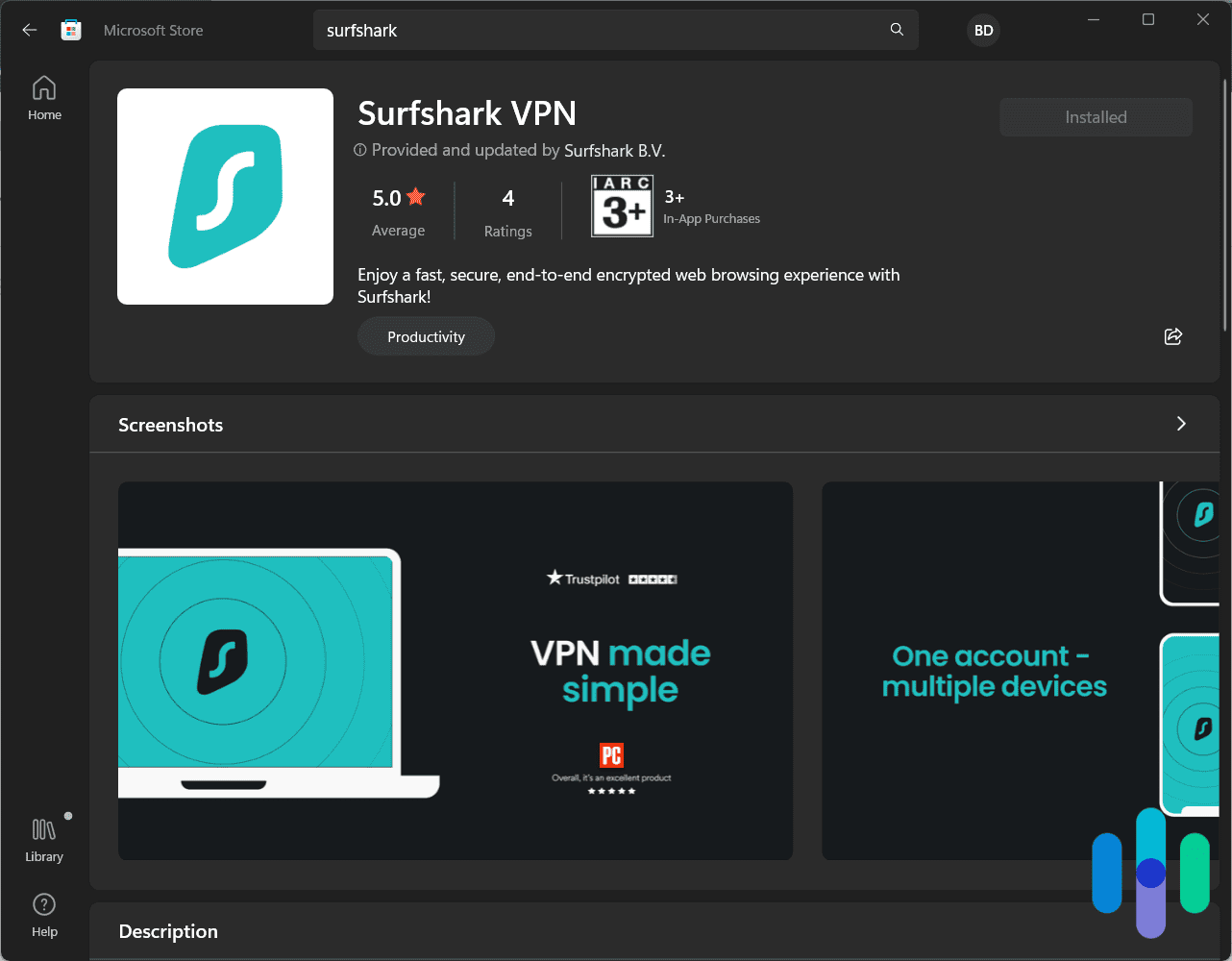
If you can’t find your VPNs app on the Microsoft Store, another option is to download directly from the VPN’s website. Now, make sure you’re downloading from the official website – there are lots of software download sites, some of which package malware into the downloads, so stay away from those.
Next, just follow these simple steps.
- Go to your PC’s Downloads folder.
- Click the VPN’s application (.exe) file.
- When prompted by your PC, allow the file to make changes to your device.
- Wait for the installation wizard to finish.
- Log in to the VPN app and start using.
Now you have a working VPN. Just look for the connect button – this is sometimes a button with the “IO” power symbol, a toggle switch, or a plain button with the word “connect.” Whatever the case, connecting a VPN is as easy as finding the right button or switch.
» Learn more: Full set up of a VPN on Windows 10
Do VPNs Work on Older Windows Versions?
We tested the best VPNs for Windows on Windows 10 and 11 PCs, but most VPN apps also work on older versions of Windows.
NordVPN and Surfshark’s apps work on Windows 7 and newer versions. The ExpressVPN app, too, plus Windows XP users can set up ExpressVPN manually on their devices using the Windows VPN setup. Lastly, IPVanish and Private Internet Access’ latest apps are supported only on Windows 10 and 11, but both have a legacy app that works on versions as old as XP.
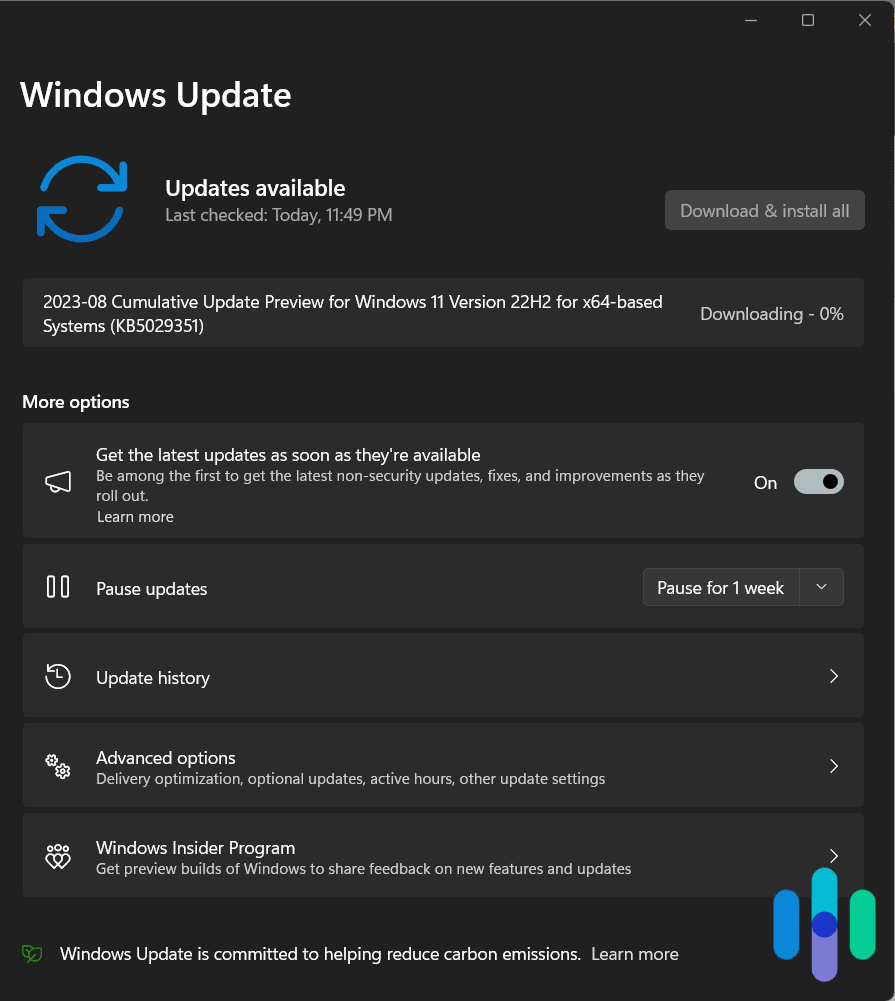
If you’re using an older version of Windows, however, the best thing to do for your cybersecurity is to upgrade to a newer version. Microsoft has officially pulled the plug on Windows XP in 20145 and Windows 7 and 8.1 in January 20236, which means these versions no longer receive security upgrades. If your Windows machine is compatible, we recommend upgrading to Windows 10 and 11 to continue receiving patches, upgrades, and updates.
Common Windows VPN Problems and How to Fix Them
Even if you have an up-to-date version of Windows, though, you may still encounter problems while using a VPN. Unfortunately, these issues are common – more common in Windows VPN apps than macOS VPNs, iOS VPNs, or Android VPNs, in our experience.
Don’t fret; they are likely going to be easy to fix. Here are some of the most common VPN issues you might encounter and how to fix them.
Issue: Failed installation
Ways to fix:
- Restart your computer.
- Disable your network’s firewall or antivirus software.
- Install the latest Windows update.
- Check if an older version of the app is already installed. Uninstall it.
- Check that you downloaded the right installer for your Windows version.
Issue: Not connecting
Ways to fix:
- Restart your PC and refresh your Wi-Fi or Ethernet connection (unplug, then replug).
- Turn off your network firewall.
- Update your PC’s network drivers.
- Check that your internet connection is working. If yes, try a different network.
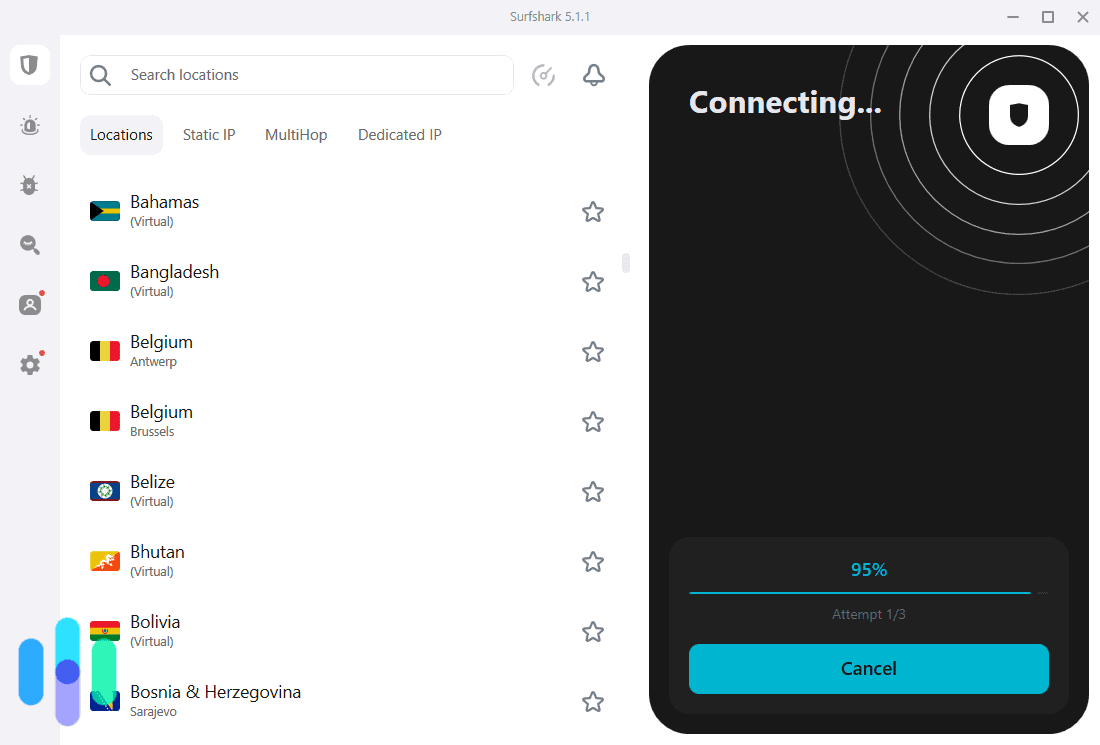
Issue: Slow connection; connected but not loading any pages
Ways to fix:
- Disconnect and restart the VPN app.
- Try a different server.
- Disconnect the VPN and test your internet speed. If no page is loading still, your internet connection might be the problem. Restart your router or contact your internet provider.
Issue: Websites still detecting your real location, IP address
Ways to fix:
- Disconnect the VPN and try again with a different server.
- Clear your browser’s cache.
- If the issue happens often, try a different VPN.
Conclusion
Since the 1990s, Windows has been one of the most reliable and widely-used desktop operating systems. It is a versatile operating system that is only getting better with time.
As much as we love Windows, though, keeping the system secure takes a lot of effort. Microsoft has recently beefed up Windows with Windows Security and Microsoft Defender, but those are not enough. Thankfully, with a good Windows VPN, you can keep your PC safe from external attacks and your online traffic private from prying eyes.
FAQs About Windows VPNs
-
How do I use a VPN on my PC?
First, you download the VPN onto your PC, click through to the opening screen, log in and turn the VPN on; it’s really that easy! If you want an even easier option, change the presets on the VPN to activate automatically upon opening your PC.
-
What is the best free VPN for Windows?
According to our research, the best free VPN for Windows is Windscribe. There are many free options for a VPN, but Windscribe fits the use case for Windows perfectly. We still recommend going for a paid option as it gives you a lot more flexibility in terms of the number of servers to use, access to customer service, and customizable security options.
-
Does Windows 10 have a built-in VPN?
Windows comes with the built-in function to serve as a VPN server, at no additional charge. This is possible by using the point-to-point tunneling protocol (PPTP); however, it can be really difficult to set up if you’re not too tech-savvy.
-
Should I use a VPN on my PC all the time?
Yes, you should keep your VPN on at all times, but especially when you are using the Internet on public networks. This will help to keep you safe from hackers, data breaches, leaks, and targeted sellers. VPNs also encrypt or obscure your web traffic and keep your data private from cybercriminals and third parties.
OpenVPN. Secure access and network connectivity reimagined.
openvpn.net/WireGuard. Home page.
wireguard.com/YouTube. Security.org Channel.
youtube.com/c/SecurityDotOrgSurfshark. Surfshark VPN servers.
surfshark.com/serversMicrosoft. Windows XP support has ended.
support.microsoft.com/en-us/windows/windows-xp-support-has-ended-47b944b8-f4d3-82f2-9acc-21c79ee6ef5eMicrosoft. End of support for Windows 7 and Windows 8.1.
microsoft.com/en-ph/windows/end-of-support?r=1


